The Summit for Democracy seems to have done more harm than good, notes Ambassador T P Sreenivasan.
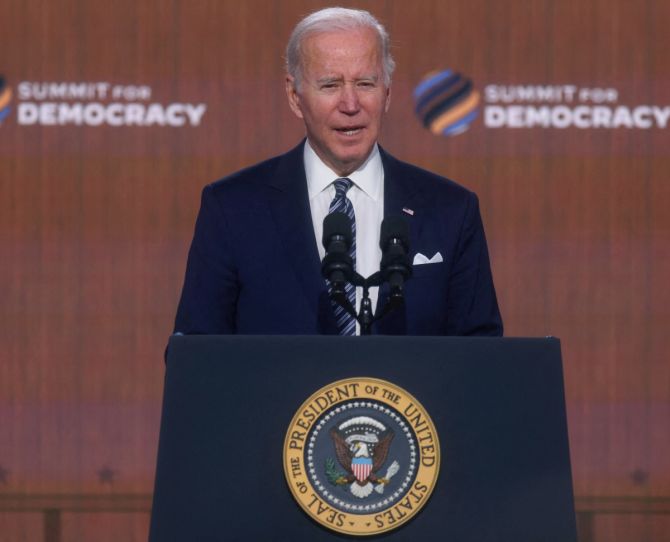
Democracy is an ideal, which humankind strives for, not an ideology to be prescribed or promoted.
There have been many definitions of democracy from statesmen, thinkers and philosophers which are aspirational, not to be measured in terms of accomplishments and then propagated.
No country in the world can claim to have a perfect democracy based on representative institutions.
The numerous components of democracy may be in existence in several countries, but a detailed examination of their gains against the definitions of democracy by Abraham Lincoln or Rabindranath Tagore or any other visionary will reveal deficiencies and inadequacies.
Democracy is like motherhood, which no one questions and it is better left alone to be pursued by individuals and states according to their lights.
Parliamentary democracies around the world have a sense of superiority over dictatorships, oligarchies, dynasties and the like, but many factors determine the nature of their governments, rooted in their culture, inclinations, state of development, threat perceptions and others and they do not remain constant.
People do not always get the government of their dreams, they get the governments they deserve.
Those who consider themselves traditional democracies should, at best, remain role models.
The moment they claim to have a perfect system to be emulated by all, the risk arises of others claiming that their systems are as good and thus erode even widely recognised democratic values.
It is for this reason that President Joe Biden's Summit for Democracy seems to have done more harm than good.
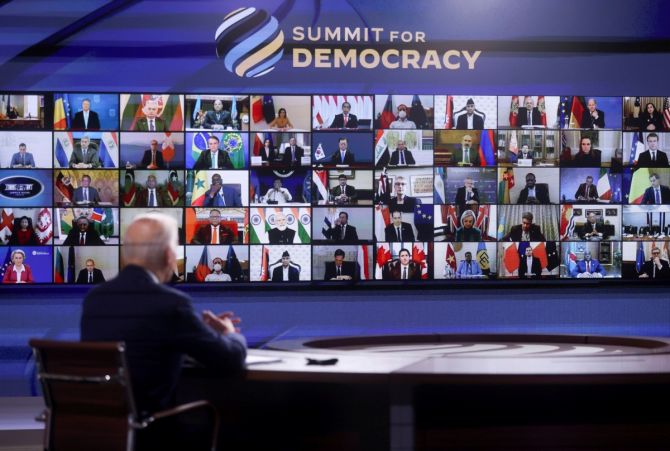
On December 9, President Biden opened the first-ever Summit for Democracy, 'a forum for leaders from around the world to discuss the challenges and opportunities facing democracies in the 21st century.'
The objective is to bolster democracy and defend human rights globally by undertaking programmes and initiatives such as supporting free and independent media, fighting corruption, bolstering democratic reformers, advancing technology for democracy and rapid response programs to support partners who are in the forefront of democratic movements.
By announcing generous funding for such activities, the natural suspicion is that the whole initiative is to bolster the image of the US and to score points over rivals like China and Russia.
This is not the first time that the US has tried to promote a community of democracies.
During the Clinton administration, the then secretary of state promoted a conference of democracies within the framework of the United Nations.
Since India was one of the partners of the United States in this endeavour, I participated in the preparatory process in Washington, which led to a conference in South Korea.
I recall that at that time, as it is now, the selection of invitees was a tricky issue as no one wanted to be labelled as a non-democracy.
The initiative lost momentum after a couple of meetings, though some non-governmental bodies have emerged as champions of democracy with different names.
This time, the participation issue became more acute because China took it upon itself to argue that it was as much a democracy, if not a better one, quoting chapter and verse of Chinese practices to prove its claim to be not only a better democracy than the US, but also a bigger democracy than India! Chinese official media compared the US championing of democracy to a morality lecture by the head of a house of ill-repute in more colourful words.
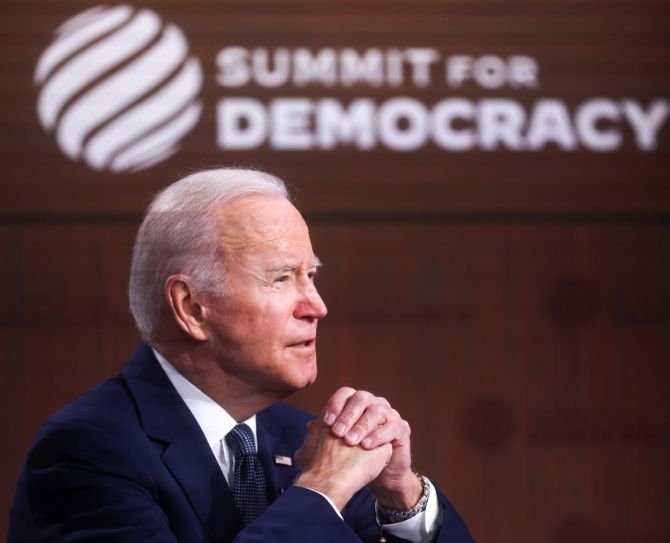
China said also that democracy was 'a common value of humanity instead of a geostrategic tool' and that the summit was aimed at defending US hegemony, which is out and out anti-democratic. China said the US has evident democratic malaise and huge democratic deficits.
A white paper put out by China made the amazing claim that China hosted the world's largest electoral democratic process.
India also came in for criticism for having a chaotic and inefficient system, implying that for large developing countries, the Chinese model was more suitable than democracy.
No propaganda by the US will alter the fact that a Chinese woman is far too superior to an Indian woman, said China.
China saw a conspiracy between the US and India in organising the Summit for Democracy to discredit Chinese achievements.
The Chinese argument that it was democratic flew in the face of the recent decision to make Xi Jinping president for life, violating an established norm of the Chinese Communist party itself.
Still, soon after the summit, China branded US democracy as a "weapon of mass destruction," used by the US to interfere in other countries."
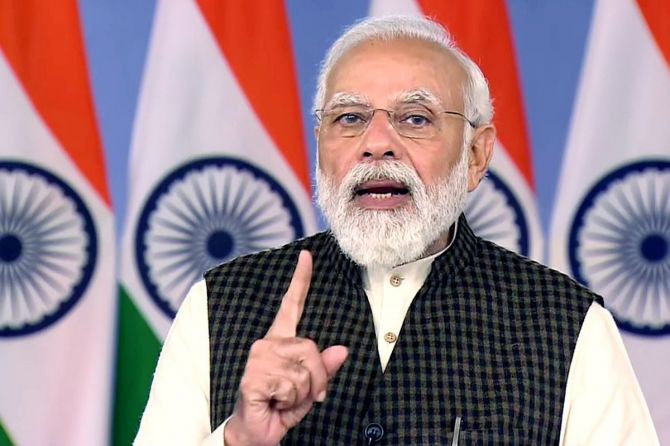
For India, the summit provided a splendid opportunity to counter charges of a decline in democracy emanating from the US itself.
Prime Minister Modi said, 'Different parts of the world have followed different paths of democratic development. There is much we can learn from each other. We all need to constantly improve our democratic practice and systems. And we all need to continuously enhance inclusion, transparency, human dignity, responsive grievance redressal and decentralisation of power.'
He did not endorse the US action plan to energise democracy, but promised to share India's expertise in holding free and fair elections, a clear dig at the US, which has had problems with elections.
He virtually amended Abraham Lincoln's definition of democracy by saying, 'Democracy is not only of the people, by the people and for the people, but also with the people, within the people.'
He also suggested that democracies should shape global norms for emerging technologies like social media and cryptocurrencies, adding a contemporary touch to democracy.
In other words, President Biden did not get a blanket endorsement for his plans to reform democracies across the world, including through funding even from India.
India seemed acutely aware of the hidden dangers of prescribing a certain version of democracy linked to promotion of human rights.
The climate change model of setting targets, funding them and monitoring progress is patently unsuitable for governing systems like democracy.
The US itself has a poor record as it has supported even tin pot dictators to protect its interests.
If President Biden's objective of calling a Summit for Democracy was to enhance his domestic and international standing, which has suffered on account of the handling of the Afghan situation, it was not worth the effort.
On the negative side, Pakistan, which was invited as a democracy as a special gesture to an old ally, turned it down in support of Russia and China, which were not invited.
The summit was exploited by China for its purposes by claiming to be a better and bigger democracy.
The summit had considerable domestic fallout too because many felt that this was not an opportune moment to project US democracy as a model when it is said to be on life support on account of the continuing bombardment of the Biden administration by Trump loyalists.
The Republicans suspected that the effort was to impress domestic opinion, rather than to promote democracy worldwide and felt that it had failed in both fronts.
It remains to be seen whether the proposed global in-person summit will be pursued next year.
Ambassador T P Sreenivasan (IFS 1967) is a former Ambassador of India and Governor for India of the IAEA.
A frequent contributor to Rediff.com, you can read his fascinating columns here.
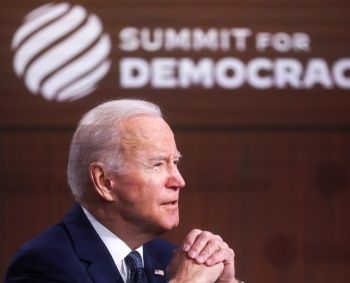
Feature Presentation: Rajesh Alva/Rediff.com

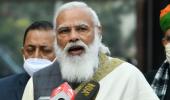









 © 2025
© 2025